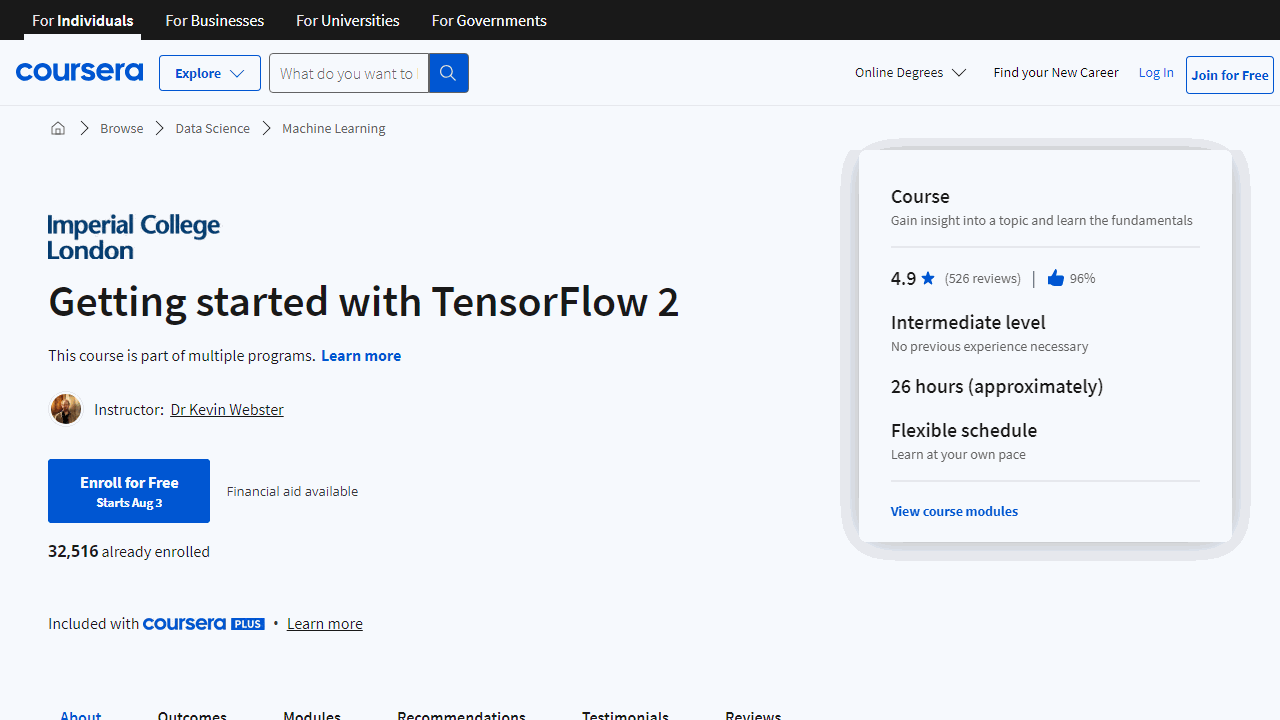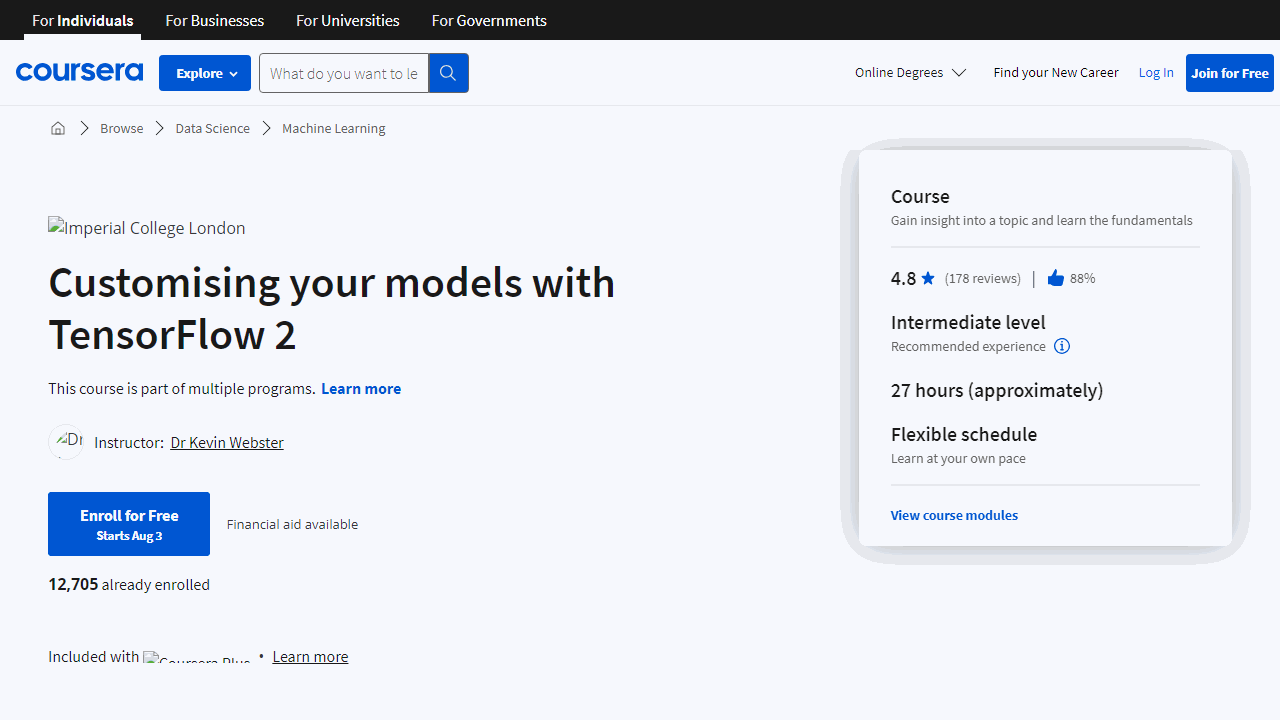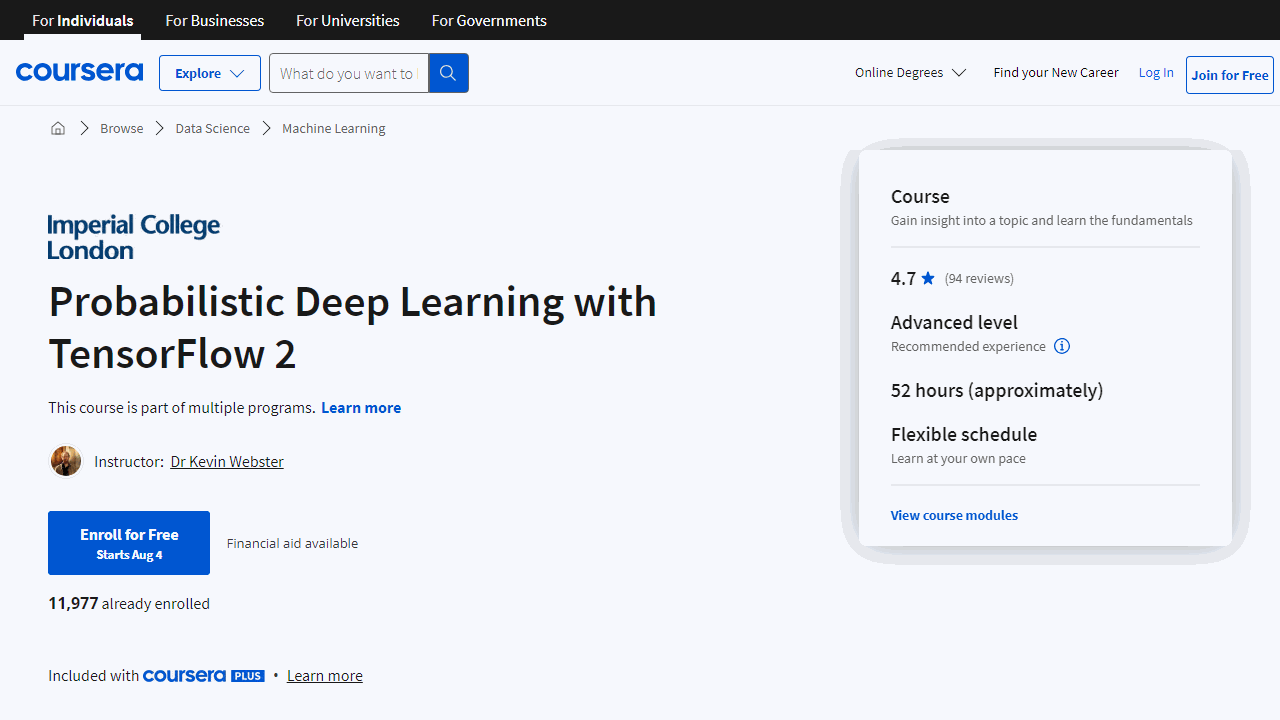- Rating: 4.8/5 with 540 ratings
- Provider: Imperial College London
- Teacher: Dr Kevin Webster
- Price: $49/month with a 7-day free trial
- Duration: Approx. 2 months if you study 10 hours per week (80 hours total)
- Pre-requisites: Python 3, basic machine learning and deep learning knowledge, probability and statistics
- Level: Intermediate
- Certificate: Yes
- Coursera Plus: Yes
Are you finding it tough to get a grip on TensorFlow 2 for deep learning?
You’re not alone.
Many learners find it challenging to navigate the complexities of this popular library used in artificial intelligence and machine learning.
It’s not easy to find a learning resource that’s comprehensive, engaging, and tailored for various learning paces.
On top of that, there’s the constant worry about keeping up with updates and changes in the API.
But worry no more!
The TensorFlow 2 for Deep Learning Specialization on Coursera is here to help.
Designed by the Imperial College London and led by Dr. Kevin Webster, this specialization offers a fantastic learning avenue.
It walks you through the ins and outs of TensorFlow 2, starting from the basics and gradually moving to more advanced concepts.
The best part is, it also includes hands-on projects to help you apply your knowledge in real-world scenarios.
By the end of this specialization, you’ll not only have an in-depth understanding of TensorFlow 2, but you’ll also be ready to tackle your own deep learning projects with confidence.
So let’s dive in and explore more about what this exciting specialization has to offer.
Getting Started with TensorFlow 2
- Rating: 4.9/5 with 526 ratings
- Duration: Approx. 26 hours
This course is highly recommended by many students for its practical approach to teaching Tensorflow 2.
It’s well-structured and organized, with short, clear, and concise videos that make learning enjoyable.
It assumes you have some familiarity with deep learning, but it’s also beginner-friendly.
Like the name says, the course is up-to-date with the Tensorflow 2 API, which means you won’t face any issues implementing the exercises.
One of the standout features of this course is the Capstone project.
It’s designed to be engaging but not overly difficult, striking the perfect balance on the difficulty scale.
The project gives you a lot of freedom to build the appropriate network architecture, and it covers all aspects involved in a MLP (Multi-Layer Perceptron).
It’s a culmination of the skills you’ve learned throughout the course.
The course also focuses on Keras, a high-level neural networks API, written in Python, that uses Tensorflow as the backend.
This focus on Keras makes the course very useful, especially if you’re already familiar with it from Tensorflow 1.
The lectures go through every line in the code, and the explanations are very precise.
However, it’s worth noting that some students have reported issues with the grading system and technical issues with the Capstone project.
Also, the instructors don’t often answer questions on the forum.
But despite these minor issues, the course is still highly recommended for its content and practical approach to teaching Tensorflow 2.
If you’re looking to get a solid foundation in Tensorflow as a beginner, or if you want to make the jump from TF 1.x to TF 2, this course is an excellent choice.
What You Will Learn
- Explore the basics of TensorFlow 2 and its new features
- Learn how to use Google Colab for TensorFlow coding tutorials
- Understand the process of upgrading from TensorFlow 1 to TensorFlow 2
- Dive into the Sequential model API and the use of Keras in building models
- Discover the functionality of convolutional and pooling layers in TensorFlow
- Master the compile, fit, evaluate, and predict methods in TensorFlow
- Learn about validation sets, model regularization, and the use of callbacks in TensorFlow
- Understand the concept of early stopping and patience in model training
- Learn how to save and load model weights, and set model saving criteria
- Gain knowledge on how to use pre-trained Keras models and TensorFlow Hub modules.
Customising your Models with TensorFlow 2
- Rating: 4.8/5 with 178 ratings
- Duration: Approx. 20 hours
Building upon the foundation set in the previous course, the second course in the specialization, continues with the hands-on approach to learning TensorFlow.
This hands-on approach is a common feature of the best deep learning courses available online.
The coding tutorial videos are highly praised by students for covering important topics like model subclassing, custom training loops, and data pipeline creation with a practical bias.
The course is also praised for its structure and organization.
Each week introduces a new topic, starting from the basics of the Keras functional API and moving to more advanced topics such as sequence modeling and automatic differentiation.
This progression makes sure you’re building on your knowledge each week, and are not overwhelmed with information.
Students particularly appreciated the capstone project, which offers a real-world application of the course content.
Although some students found it challenging, they also found it rewarding and a great way to solidify their understanding.
One unique aspect of this course that students highlighted was the use of TensorFlow documentation.
This course not only teaches TensorFlow 2 but also shows you how to navigate and use the documentation effectively.
This is a valuable skill that will serve you well in your future projects.
However, it’s worth noting that some students found a gap between the weekly assignments and the capstone project.
They felt that the capstone project was a bit more demanding than the assignments.
Despite this, they still found the course valuable and highly recommend it.
The course instructor is praised for his clear and concise lecture videos.
In summary, this course offers a mix of theory and practical application, with a strong emphasis on hands-on learning.
The course is challenging but rewarding, and it’s a great way to improve your TensorFlow skills.
What You Will Learn
- Understand the Keras functional API and how to implement multiple inputs and outputs in your models.
- Learn about variables and tensors, their importance in TensorFlow, and how to use them in your code.
- Gain knowledge on how to access layer variables and tensors in your models, and the significance of these layers.
- Discover the concept of freezing layers and how it can be beneficial in your model training process.
- Explore Keras datasets and dataset generators, and how to use them to feed data into your models.
- Delve into sequence modelling, including preprocessing sequence data and using the Embedding layer.
- Get hands-on experience with recurrent neural network layers, stacked RNNs, and the Bidirectional wrapper.
- Learn about model subclassing and how to create custom layers in your models.
- Understand the concept of automatic differentiation and its role in TensorFlow.
- Master the use of the tf.function decorator and custom training loops to optimize your model’s performance.
Probabilistic Deep Learning with TensorFlow 2
- Rating: 4.7/5 with 94 ratings
- Duration: Approx. 20 hours
This final course integrates the lessons learned in the previous two courses and introduces a comprehensive view of TensorFlow probability and the fundamentals of probabilistic deep learning.
It’s a rare find, as it’s one of the only MOOCs that provide such a holistic view of this domain.
The course is structured in a way that mixes theory, coding tutorials, readings, and links to articles, which makes for a well-rounded learning experience.
The lecture videos are clear, concise, and to the point, and the assignments are structured in a way that tests your skills effectively.
The feedback from these assignments is also super helpful and can guide your learning process.
It not only introduces and explains TensorFlow 2.0, but it also delves into other significant algorithms in machine learning.
These include RealNVP, autoregressive flow, variational autoencoder, and bayes by backprop, to name a few.
However, it’s important to note that this course is not for the faint-hearted.
It covers a lot of concepts that require a solid background in Python, machine learning, and statistics.
But don’t let this deter you.
Even if you’re a beginner, with some extra effort and additional resources, you can still get a lot out of this course.
For instance, you could consider getting a refresher on mathematics for machine learning to grasp some of the mathematics presented.
While the course is generally well-received, some students have pointed out areas for improvement.
For instance, some of the lab assignments contain bugs and misleading instructions.
Also, the course could benefit from more active support from the course providers in the discussion forums.
However, these issues do not overshadow the overall quality and relevance of the course content.
What You Will Learn
- Understand the basics of the TensorFlow Probability library and its application in probabilistic deep learning.
- Learn about univariate and multivariate distributions and their role in probabilistic models.
- Gain knowledge on the Independent distribution and its application in TensorFlow.
- Master the concept of sampling and log probabilities in probabilistic models.
- Learn how to create trainable distributions using TensorFlow.
- Understand the need for uncertainty in deep learning models predictions and how to implement it using probabilistic layers.
- Learn about the DenseVariational layer and reparameterization layers in TensorFlow.
- Gain knowledge on bijectors and normalising flows, and their role in creating complex probabilistic models.
- Understand the concept of variational autoencoders, encoders and decoders, minimising KL divergence, and maximising ELBO.
- Apply the learned concepts in a capstone project, demonstrating the practical application of probabilistic deep learning with TensorFlow 2.
Frequently Asked Questions
How Long Does It Take To Complete The TensorFlow 2 for Deep Learning Specialization?
It’s estimated to take approximately 2 months to complete if you study around 10 hours per week.
This means the total duration of the specialization is roughly 80 hours.
However, the actual time it takes can vary depending on your prior knowledge, learning pace, and the amount of time you can dedicate to the courses each week.
How Much Does The TensorFlow 2 for Deep Learning Specialization Cost?
The TensorFlow 2 for Deep Learning Specialization on Coursera costs $49 per month.
This fee gives you access to all the course materials, graded assignments, and a certificate upon completion.
The specialization also offers a 7-day free trial, allowing you to explore the course content before committing to the monthly fee.
Please note that prices may vary depending on your location and any promotions Coursera may be running at the time.
Is The TensorFlow 2 for Deep Learning Specialization Part Of Coursera Plus?
Yes. Coursera Plus subscribers have access to the TensorFlow 2 for Deep Learning Specialization.
What Is The Difference Between A Coursera Course And A Specialization?
A Coursera course is a single, standalone module that focuses on a specific topic. It includes video lectures, readings, quizzes, and sometimes a final project or exam.
Once you complete a course, you receive a certificate of completion.
On the other hand, a Coursera Specialization is a series of related courses designed to help you master a specific topic.
Specializations are structured to provide a deeper, more comprehensive understanding of a subject area.
They often culminate in a capstone project that allows you to apply what you’ve learned throughout the courses.
Once you complete all the courses in a Specialization, you receive a Specialization certificate.
So, the main difference is that a course is a single module on a specific topic, while a Specialization is a series of related courses designed to provide a comprehensive understanding of a broader subject area.
How To Get The TensorFlow 2 for Deep Learning Specialization For Free?
Coursera offers financial aid for students who cannot afford the fee.
You can apply for financial aid by clicking on the “Financial aid available” link next to the “Enroll” button on the course page.
You’ll need to fill out an application and wait for approval, which can take up to 15 days.
Also, Coursera occasionally offers promotions or discounts, so it’s worth checking their website regularly.
Please note that while you may be able to access some course materials for free during a trial period, you typically need to pay for the course to receive a certificate.



